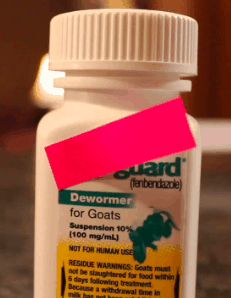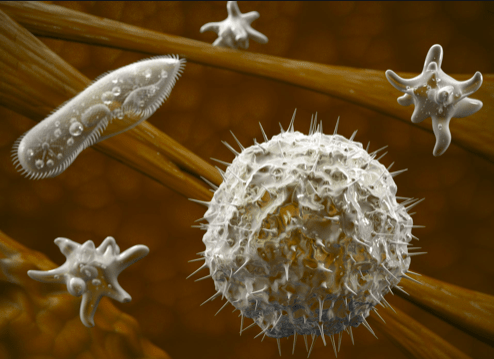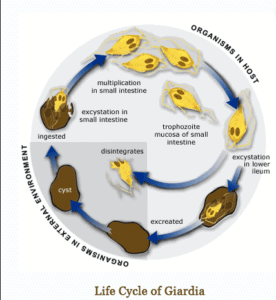Giardia and Coccidia—Parasite or Bacteria? How can it harm my dog? If my dog picks it up, how do I get rid of it?
If your dog is experiencing watery stools? (not soft but watery or squirting) You may want to check for these two hidden, very hard to find parasitic protozoa (unlike intestinal worms) lurking in your dog’s GI tract. If you’ve ever been to Mexico and didn’t drink the water—it’s, most times, because these are lurking in their water sources—they sell drugs for it at their pharmacies! I have to admit, I’ve gotten giardia myself while traveling. Our dogs are even more sensitive to water change, no matter what. However, during years when it’s very WET and there have been a lot of dogs and puppies running around drinking puddles, licking wet plants, and drinking standing water, which is where giardia tends to grow, it can creep up.
Giardia seems to be very antibiotic resistant, so natural antibiotics may be needed. Many are available on amazon and some I’ll list them here as a natural protocol:
–Colloidal Silver (2 x a day)
–Natural Antibiotic (2 x a day)
–Natural dewormer (2 x a day)
–Natural anti-diarrhea (2x a day)
-high quality, heat resistant probiotics to heal the GI track, and protect it from damage. This particular one is what I recommend: Wellness Supplement
–Bentonite Clay can be sprinkled on their raw food each day as a natural anti-parasitic (in a different way, Diatomaceous Earth treats other parasites plus crawling and crawling insects)
Coccidia is very similar and is also found to be dormant in your dog’s digestive tract, but only shows signs during stress. It can be found in the ground outside (dirt), standing water, and in other dog’s feces, or passed from the mother.
 “Safeguard”- an Rx usually used to treat Giardia
“Safeguard”- an Rx usually used to treat Giardia
Many veterinarians and scientific research has shown giardia and coccidia to be something that lies dormant in your dog’s GI tract but only gets stirred up when there is stress (like going to a new home!). So its important to check your dog’s stool sample more carefully as these two ‘bacterial parasites’ (as opposed to intestinal “worms”) are harder to spot and at least 3 fecal floats must be done to be sure it’s not there. Although we routinely worm and do fecal checks on all of our adults, we STILL do a stool sample on each litter/pup to check to insure there are no intestinal worms or parasites, protozoa, or bacteria. If there is a positive test result we treat immediately for 5 days, if symptomatic. Some veterinarians don’t even treat for giardia as healthy dogs with the proper ph level and proper bile make their bodies intolerable to parasites, and flush it out on their own. Literally feeding a raw, species-appropriate diet for 2 weeks will return your dogs ph level to normal and their bile will make the environment unwelcome to bacteria and parasites and allow their body to naturally shed all unwelcome organisms. Kibble filled with starches tends to feed bacteria, so if your pup shows a positive test result, there are a few things to do immediately:
- Give canned pumpkin to stop the watery stool. Puppies get dehydrated quickly (to check for proper hydration, pull skin up on neck and see if it snaps right into place, if it does not, administer electrolytes and fluids.)Also be sure to check their gums are nice and pink. Metronidizole is usually what vets administer but it’s an antibiotic, and as those go, they can become resistant. So see link to an all natural anti-diarrheal above.
- Feed bottled water, or ph balanced water (you can buy these contraptions to treat your water on amazon—its good for you too! We love ours!) so your dog’s body can rid itself of the protozoa and expel them naturally. Give a bath to rid the coat of any spores or cysts at the end of treatment. Take special care to wipe their paws when they come inside from going potty.
- Allow your dog to only eliminate in a roped off area of the yard until you get an “all clear” test from your vet. Then cover the area with dirt or pine shavings and let sit. Clean up all feces all the time until you retest and get a “clear.”
- If your dog has not been on antibiotics a lot, your vet may recommend treating giardia with Panacur and possibly Flagyl (Metronidizole) for diarrhea. For coccidia, either Albon or Ponazuril are used for treatment. (use same protocol for elimination in your yard when dealing with coccidia) I will also list all-natural diarrhea control products (besides the pumpkin) above so you can avoid more antibiotics like metronidizole, a medication given to control diarrhea.
If you have other pets, allow them to eliminate in a different area than the affected pet. You can give them any of the above all-natural tinctures as a PREVENTATIVE while you treat your affected dog or puppy.



5 Comments